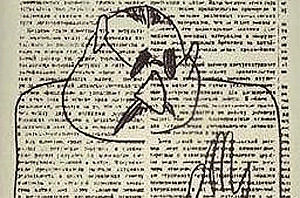ON BUREAUCRATIC VIOLENCE AGAINST LITERATURE (I) 0
(Publicist’s research) Mindaugas Grigaitis – literature critic
www.kamane.lt, 2007 11 26
“Bureaucrat” according to S.Eisenstein. From www.sovlit.com (via www.menufaktura.lt)
In brief: A wordplay is spread among people observing the situation of literature that the Lithuanian Writers’ Union is a structure turning budget money into waste-paper. The Chairman of Kaunas Branch of LWU Petras Palilionis asserted recently that 180 books were published by writers headed by him during the latter four years. Kaunas writers published 47 books in 2005 only. Having in mind that the branch has 53 members, the amount of published books seems really great.
The author of the article decided to check the wordplay on waste-paper and the statistics of books issued by Kaunas Branch, as one of the biggest branch of the union may serve as a ground for judging about the activity principles of the entire creative union. In order to find our more about the publication policies and reading data of books published by Kaunas Branch, the author of the article attempted to contact the Chairman of this Branch P.Palilionis first. However, after making several attempts, the author received the secretary’s (Gintarė Klimaitytė) answer to search for responses to questions in the bylaws of the LWU, Kaunas Municipality, libraries and bookstores.
Therefore, the author had to find out about the popularity of books independently. He compiled a list of publications which were praised the most and which received prizes during latter years and turned to Kaunas County Public Library and publishing companies Alma Litera, Šviesa for information about the reading and buying data of books.
The list included authors who received One Litas prize: “Mišiuginas’ Diary” and the humour book “Misses, My Lady and Other Issues” by Jurgis Gimberis, short-story book “Illusionist” by Markas Zingeris, selection of poems “Street Musician” by Tautvyda Marcinkevičiūtė, historical novel “Revenge of Dying Gods” by Jonas Laucė, “Daughter-in-law of Wolves” by Violeta Šoblinskaitė, short-story of fragments “Silver Gardens” by Aldona Ruseckaitė, and the selection of poems “General Tired of Winning” by Donaldas Kajokas.
The list was replenished by almanacs issued from the municipality funds “Poetry Spring 2005/2006” and “Youth of Kaunas” as well as the books by the winner of J. Aistis prize Robertas Keturakis “And Never Late” and “Ahasferas”. The objective was to find out whether books valued by Kaunas Writers’ Union the most corresponded the cultural needs of the society.
According to data presented by Asta Valaitytė, chief methodologist of Kaunas County Public Library (KCPL), the almanac “Poetry Spring 2005” interested only 16 readers from its publication to autumn of 2007. The almanac of 2006 was read 11 times. Almanacs are not sold in great amounts as well: according to Alma Littera and Šviesa data on sales, the almanac of 2005 did not interest buyers, and the almanac of 2006 was not even offered in the chain. The demand for the almanac “Youth of Kaunas” is even more tragic.
It shows that professional Lithuanian poets and young Kaunas writers selected by a special committee are not interesting to the society. The critical evaluations of reviewers and the society’s response should have made publishers rethink the conception of these publications. It is a significant signal about the abyss between the priorities of the Writers’ Union Branch and the opinion of the society already.
The abyss is not filled by indexes of other works evidently protected by the Branch: “Mišiuginas’ Diary” by Jurgis Gimberis was borrowed from the library 3 times from 2002 to October 19 of 2007, “Misses, My Lady and other Issues” - 7 times during the same period. The first book did not attract much interest in bookstores, and the latter was not even sold in bookstores. Meanwhile, the most popular book of Kaunas writer, the selection of essays by Kęstutis Navakas “Chronicles of Good Life” was borrowed 90 times in 1.5 years, thus, the demand for it was rather high. According to Alma Littera and Šviesa data, K.Navakas’ book enjoyed the greatest demand in bookstores as well.
The novel of J. Laucė was borrowed 51 times from 2002 to this autumn, the book by V. Šoblinskaitė interested readers 58 times (in four years). Still, “Daughter-in-law of Wolves” did not enjoy great sales, and the novel of J.Laucė was not sold in Alma Littera and Šviesa bookstores. The popularity of other favourites of the LWU Kaunas Branch was even smaller.
In addition to K.Navakas, only the novel “Blinded by the Glow of Crown” by Rimantas Marčėnas enjoyed a similar popularity from the circle of Kaunas Branch writers. Readers of Kaunas and entire Lithuania took interest in this novel. According to the library data, the novel was borrowed 27 times in half a year. Of course, the artistic quality and importance of the works of these two writers may be disputable; still, the writers have their audience for sure.
The writers’ argument that the popularity of a book does not prove its quality is grounded sometimes; therefore, the author also looks at books from the position of literature critics. The almanacs of the Poetry Spring did not interest the society or the critics. The author of the article did not find any reviews of mentioned works of J.Gimberis, J. Laucė, M. Zingeris and T.Marcinkevičiūtė. The works of V.Šoblinskaitė, A.Ruseckaitė and D.Kajokas received more attention, which was mostly shown by colleagues. Meanwhile, K.Navakas and R.Marčėnas received really different reviews.
As a result, the moderate attention of literature critics or complete indifference towards books published by the LWR, Kaunas Branch, shows that the works of elite Kaunas writers are not important to our literature. The coincidence of reactions of literature critics and the society allows making rather radical conclusions. If the elite of Kaunas Branch writers is recognised only by the members of this Branch, it is possible to state that the budget funds of Lithuania and Kaunas residents are used for supporting a closed sect of writers. The attempts to state that the consumer society is not interested in "serious literature" is hypocrisy. The criteria according to which dozens of thousand Litas are distributed from the budget for publication of books also remain unclear.
If literature interesting only to few is funded and the LWU Kaunas Branch avoids answering “why”, it is possible to assert that literature has appeared in the clawsof bureaucrats’ lawlessness, as decisions are based not on the quality of works but on the ideology and interests of the people managing LWR branches. The author wonders whether the tradition of bureaucratic violence against literature is alive in the entire Lithuanian Writers’ Union. Thus, the author of Kamanė is going to continue the research, as it seems meanwhile that one branch of the LWU really reminds of a structure reproducing budget money into waste-paper.









